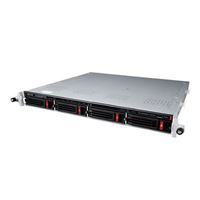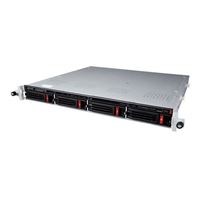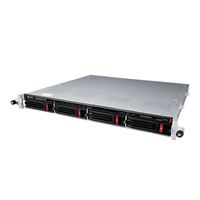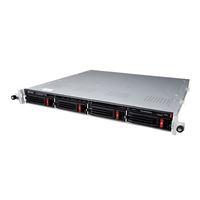Network Attached Storage: All Your Data in One Place
A network attached storage device, or NAS system, is a type of data storage system that combines some of the best aspects of local and cloud storage. The basic concept: You set up a NAS unit and install one or more hard drives in it. Then, you connect the NAS to your home or business network via Ethernet or WiFi. After some basic setup, your storage is now easy to access from anywhere in the network — or even when you are on the go, if you use certain options.
NAS systems are an increasingly popular storage solution for both home and small business applications. That is because they offer some important advantages, such as:
Centralized data location makes your data easy to access from any designated device
Store everything from home office records to media to games
Easily and automatically create redundant backups of your most important data
Support for various RAID configurations to customize your storage
Private cloud features make it easy to implement data security solutions
Upgrade to more storage capacity later with bigger drives or more drives
Choosing a NAS Solution
What should you look for when evaluating NAS solutions for your data?
RAID Functionality: RAID or Redundant Array of Independent Disks is a popular storage configuration that uses a group of hard drives working together. Multiple RAID configurations are available, so check which ones your NAS unit supports.
Diskless vs. Disks Included: This simply denotes whether the NAS unit comes with hard drives. Purchasing a diskless unit can save money if you want to purchase particular drives although it is important to verify that the drives you buy are designed for NAS use.
SSD vs. HDD: While the majority of NAS devices use hard disk drives due to their cost effective nature and 24 / 7 reliability, NAS systems that use solid state drives are also available.
Drive Bays: Most home and small business NAS solutions come with one or two drive bays for mounting storage devices, although some models offer as many as four or even more. More drive bays means more RAID options and more storage capacity.
Speed:Various factors can affect the speed of a NAS device. Check the device CPU specs to ensure that its processor is up to your demands, and look for one with gigabit Ethernet support to ensure snappy data transfer speeds.
Shop Micro Center’s full array of NAS solutions here, with great prices on A list brands like QNAP, BUFFALO, WD, and more. Shop all of our hard drives for low prices on HDDs designed specifically for NAS use.
Hard Drives and Data Storage for Your Most Important Files
Even in the age of streaming and cloud storage, all computers still need a primary local storage device. This type of storage must use non volatile memory, meaning it retains its data even when the computer is powered off, and must store the data in the end users location rather than in the cloud. In most systems, this is known as the hard drive.
Although the term hard drive technically means a traditional hard disk drive or HDD with a spinning magnetic disk, it is commonly used to mean all kinds of data storage devices, including todays hugely popular solid state drives or SSDs. SSDs use NAND flash memory with no moving parts, making them both faster and more resilient than traditional HDDs — although HDDs have advantages of their own, including lower prices.
Some users only need a fast and reliable internal drive for their computer, while others need high capacity external drives for storing multiple terabytes of bulky files.
Businesses, meanwhile, often need even higher storage capacity drives for their network attached storage or NAS systems, which use multiple drives to provide access to data across a local network and may use a redundant configuration called a RAID array. Whether you are looking for an SSD or HDD, internal or external, you will find the right option for you in Micro Centers extensive selection of storage drives.
Choosing Your Data Storage Solution
Considering these factors will make it easier to find the right data storage solution:
SSD vs. HDD: SSDs are the most popular choice for storage because they are extremely reliable and offer high speed performance on everyday tasks. HDDs, meanwhile, offer solid reliability in less strenuous environments and tons of storage space for an affordable price. See our SSD vs. HDD guide for more key information on this important choice.
Data Transfer Speed: The speed at which a hard drive moves data to or from a device can matter a lot, especially if you often send files to an external drive. If transfer speed is a priority on your external drive, look for USB 3.0 drives or higher, which offer faster speeds as long as your computer ports also support USB 3.0.
Interface: Most internal HDDs and some internal SSDs use the classic SATA interface, which attaches via a SATA port on your motherboard. SSDs might also use the newer NVMe format, which offers faster speeds but is not present on all motherboards. External hard drives almost always use either a USB A or USB C connector.
Form Factor: Pay attention to the physical size and shape of your drive, especially if it is an internal hard drive. Many newer SSDs, for example, use the slim M.2 design, while others may use the larger 2.5 inch form factor. HDDs, meanwhile, may use either 2.5 inch or 3.5 inch bays. Remember to check whether your motherboard includes an M.2 slot or the bay size of your computer or NAS server box.
Operating System: Some SSDs and HDDs are designed for compatibility specifically with Windows or macOS. This also matters for file formatting since you might have to reformat your drives storage system if it uses a file format that is not compatible with your OS.
Data Recovery and Backup: Some manufacturers offer data recovery options if your drive fails. Check the drives warranty and specs to learn about the conditions and capacities of each data recovery service. Of course, the best option is to create robust backups to minimize your risk of data loss in the first place, and we highly recommend using an external drive or cloud backup service to back up any local storage volume.
Micro Centers hard drive selection includes all of the top names in computer hard drives like Western Digital, Seagate, Samsung, Toshiba, and more. Find great deals on your data storage solution here, or check out our lineup of SD cards and USB flash drives for more storage options that perform whenever and wherever you need them.




